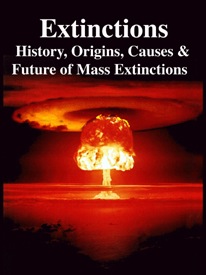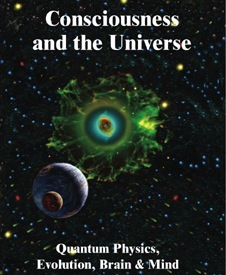|
|
|||||||||||||||
Journal of Cosmology, 2009, Vol 3, 641-643. JournalofCosmology.com, 2009. "Cosmos and Quantum: Frontiers for the Future" Theodore Walker Jr., Ph.D. Southern Methodist University, Perkins School of Theology, Dallas, Texas, USA. A possible mechanism by which mental acts may be synchronized with physical states is postulated. In "Cosmos and Quantum Frontiers for the Future," Menas Kafatos (2009) prescribes a "future science" of "undivided wholeness" incorporating insights from quantum physics and perennial philosophies. For the sake of advancing this future science, we should observe that some of these insights (including the importance of process and relativity, universal mind, universal individuality, and cosmic indeterminacy) have also been well developed in the process-relational and neoclassical philosophies instructed by the works of Alfred North Whitehead and Charles Hartshorne. keywords: quantum universe, process, relativity, process-relational philosophy, neoclassical philosophy, neoclassical theology, consciousness, panpsychism, psychicalism, universal psychicalism, psychical variables, cosmic variables, universal undivided wholeness, universal individual, quantum indeterminacy, cosmic indeterminacy, future science, neoclassical cosmology
1. The Future and the Importance of Process and Relativity In his "Cosmos and Quantum: Frontiers for the Future," Menas Kafatos (2009) prescribes the development of a "future science" of "undivided wholeness". Here Kafatos calls for a science incorporating insights from quantum physics, including the insight that the quantum universe evidences the "interconnectedness of everything" via "non-local interactions," that "process is much more important than "building blocks", and that "the whole is not just the sum of its constituent parts". And, he calls for incorporating insights from perennial philosophies, including the insight that "the universe may verily be the conscious universe". For the sake of advancing this future science, we should observe that insights into the importance of "process" have also been well developed in the "process philosophy" instructed by Alfred North Whitehead's Process and Reality: An Essay in Cosmology (Gifford Lectures, 1927-28), and in the closely related and substantially overlapping "neoclassical philosophy" and "neoclassical metaphysics" instructed by Charles Hartshorne's (1953)Reality As Social Process. Interconnectedness and relativity are also essential to Hartshorne's social conception of reality, including divine reality. For example, in The Divine Relativity: A Social Conception of God Hartshorne (1948) describes divine social relations as "supremely-relative" and "surrelative" (p. 1). For Hartshorne, "relativity" is not less important than "process." And in the interest of not favoring "process" over "relativity, " Hartshorne prefers to employ the term "neoclassical" because "neoclassical" implicitly embraces both "process" and "relativity" while providing explicit contrast with "classical. " Accordingly, Hartshorne-instructed process philosophers frequently speak of "process-relational philosophy." 2. Consciousness and "Universal Psychicalism" Kafatos (2009) prescribes that "if we start from the premise that consciousness is the underlying foundation of the physical, mental, psychic and all possible realms, one needs to look at the systems of philosophy dealing with consciousness ". Neoclassical and process philosophies are among the systems one needs to study for advancing inquiry into the full range of mental-psychic processes. Concerning the conscious universe: Neoclassical philosophers affirm that "the one all-inclusive whole of reality" (Ogden, 1984, p. 21) is the supremely sentient (omniscient) "ultimate reality" that some religious people rightly identify as "God" [as the one reality that is so great that "none greater can be conceived" (Anselm)]. In fact, this affirmation distinguishes neoclassical theology from all of the many classical theologies that identify "God" (or "gods" ) with some less-inclusive part(s) of reality. The idea of a supremely conscious universe is essential to, and fully developed in, neoclassical theology. Furthermore, inquiry into "the possibility that consciousness is the foundational substratum of the universe" and cuts "across all levels of the cosmos" (Kafatos, 2009) has also been advanced by Hartshorne. In Beyond Humanism: Essays in the Philosophy of Nature Hartshorne (1975 [originally 1937]) advances a doctrine he called "panpsychism" in 1937, and "psychicalism" or "universal psychicalism", a doctrine which holds that "psychical variables" —such as "sensations or feelings" (p. 118) and "memory" --are "cosmic variables" that apply in varying degrees throughout the cosmos, throughout "the whole scale of beings" (p. 121)— "running from the least particle of inorganic matter to the great universe itself" (p. 112). "Universal psychicalism" witnesses against the existence of wholly insentient, wholly inanimate, and totally mindless physical matter. In "The Physical and the Spiritual," a chapter in Omnipotence and Other Theological Mistakes (1984), Hartshorne argues that, rather than being two separate realities (dualism), the physical-material and the spiritual-mental-psychical are distinct aspects of one reality (monism). Contrary to both classical "universal materialism" (another monism) and classical mind-body/mind-matter dualism, neoclassical "universal psychicalism" ( "the more intelligible monism," says Hartshorne) holds that "all nature is in some sense life-like, that there is no absolutely new principle of life that comes in at some point in cosmic evolution " (Ibid, p. 62-63, italics added). Here and in numerous other more technical books and articles, Hartshorne makes important contributions to inquiry into "psychical variables" on all levels of reality. 3. Universal "Undivided Wholeness" and the Universal Individual Kafatos writes of the "undivided wholeness". However, he does not explicitly indicate if that universal "undivided" whole is "individual." For instance, Kafatos writes, "As the quantum and the universe are ultimately and intimately interconnected, so are the individual and the universal consciousness" (Kafatos, 2009). Notice that here Kafatos contrasts "individual" consciousness with "universal consciousness." Similarly, Kafatos writes, "This is certainly a reversal of the usual scientific method, here we start from the whole, from the general, from the universal, from the unlimited, and we end up going to the individual, the particular, the limited". Therefore, Kafatos appears to contrast whole, general, universal, and unlimited, on the one hand, with "the individual," "the particular," and "the limited" on the other. According to neoclassical thinking, unlike with "the particular" and "the limited," "the individual" should not be included in a contrast with universal wholeness. Instead, it is argued that "individual" and universal wholeness go together. Insofar as the word "individual" (in-divide -ual) implies "not divided" into separate parts, to speak of an actual universal "undivided" whole is to speak of a universal "not divided‟ whole, a universal "individual" whole— "the one universal individual" (Hartshorne, 1953, p. 176). Instead of applying to only one of two hands (the one universal/all-inclusive individual on the one hand, and many variously less-inclusive individuals on the other hand), individuality can be applied to both: Individuality applies strictly, and eternally, to the one universal individual. And, by contrast, individuality applies only loosely, and for only segments of time, to less-inclusive individuals, including human individuals from whom parts can be divided-separated (departed). Though parts of reality can be divided-separated from other parts of reality; no part of reality can be divided-separated from the all-inclusive whole of reality. Hence, according to neoclassical theology, the all-inclusive divine whole of reality is strictly individual, the one and only "strictly universal individual" (Ogden, 1984, p. 27, italic added). 4. Quantum Indeterminacy and Cosmic Indeterminacy In accordance with Kafatos's call for applying indeterminacy beyond the quantum level, even to the point of conceiving of a quantum universe; neoclassical theology holds that the "strictly universal individual" sometime identified as "God" is the one and only individual that makes a partly determinative difference to all events, and the one and only individual to which all events make a partly determinative difference (Ogden, 1989). Contrary to absolute determinism in classical physics, and contrary to absolute determinism in classical theology, process philosophy and neoclassical theology deny that any real thing or event can be wholly determinative of any other(s), or wholly determined by any other(s). All real things and all real events are functions of both partial freedom and partial determinism. According to process-relational and neoclassical philosophies, at all levels (cosmic, intermediate, and quantum), reality admits no absolute determinism. 5. The Future and Neoclassical Cosmology We should accept Kafatos's quantum universe inspired calls for viewing "process" as fundamental, for appreciating indeterminacy at all levels, and for viewing all "parts of reality" as interconnected-related parts of the undivided [individual] conscious whole of reality. As scientists advance into this frontier, in addition to encountering insights from perennial philosophies, they will encounter process philosophers, process theologians, neoclassical philosophers, neoclassical metaphysicians, and neoclassical theologians. And perhaps together, unencumbered by classical materialist and classical mind-matter/mind-body dualist presumptions, we can develop a new science of undivided wholeness, a new neoclassical cosmology.
Hartshorne, C. (1975). Beyond Humanism: Essays in the Philosophy of Nature. Gloucester, Massachusetts: Peter Smith, originally 1937.
Hartshorne, C. (1948). The Divine Relativity: A Social Conception of God. New Haven: Yale University Press, 1948, 1964, 1983.
Hartshorne, C. (1984). Omnipotence and Other Theological Mistakes. Albany, New York: State University of New York Press.
Hartshorne, C. (1953). Reality As Social Process: Studies in Metaphysics and Religion, edited by James Luther Adams. Glencoe, Illinois: Free Press; Boston, Massachusetts, Beacon Press: Boston.
Kafatos, M. (2009). Cosmos and Quantum: Frontiers for the Future. Journal of Cosmology, 2009, 3, 511-528.
Ogden, S.M. (1989). Faith and Freedom: Toward a Theology of
Liberation: Revised and Enlarged Edition. Eugene, Oregon: Wipf and Stock, originally Nashville, Tennessee, Abingdon Press, 1979.
Ogden, S.M. (1984). Process Theology and the Wesleyan Witness. Perkins School of Theology Journal, Vol. 37, No. 3, Spring 1984, pages 18-33.
Whitehead, A. N. (1978). Process and Reality: An Essay in Cosmology: Gifford Lectures Delivered in the University of Edinburgh During the Session 1927-28: Corrected Edition, edited by David Ray Griffin and Donald W. Sherburne. New York, New York: The Free Press, 1978, originally 1927-28.
|
|
|
|
|
|
|
|
 Colonizing the Red Planet ISBN: 9780982955239 |
 Sir Roger Penrose & Stuart Hameroff ISBN: 9780982955208 |
 The Origins of LIfe ISBN: 9780982955215 |
 Came From Other Planets ISBN: 9780974975597 |
 Panspermia, Life ISBN: 9780982955222 |
 Explaining the Origins of Life ISBN 9780982955291 |












